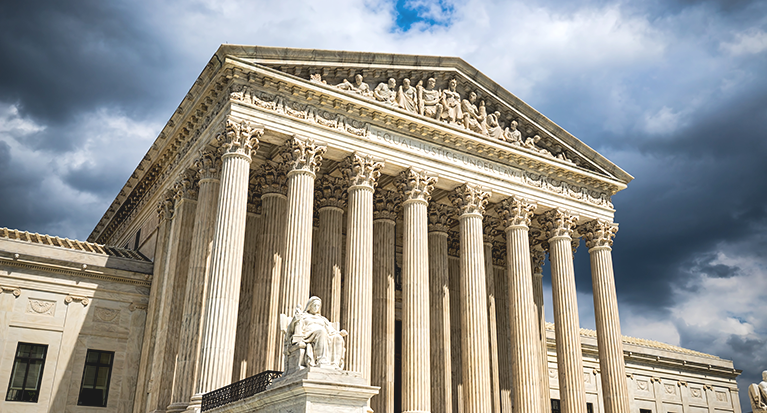The extremely disappointing ruling by the U.S. Supreme Court in June Medical Services v. Russo provides an important lesson for prolifers. Really, the legal analysis and the lesson in this case are one in the same, and it’s the only necessary fact you need to remember moving forward.
On social media, we promised an in-depth analysis of June v. Russo once we had a chance to read the opinions. There’s certainly interesting points in there, for example, abortionists explaining how they can do more than 30 abortions a day. However, the only necessary legal analysis is this: Chief Justice John Roberts chickened out.
5 Supreme Court justices agreed Louisiana’s abortion clinic regulations don’t violate the U.S. Constitution. However, by a 5 to 4 vote, the Court struck down those perfectly acceptable rules.
Louisiana’s law is as clear as can be. Louisiana requires ambulatory surgical facilities to obtain admitting privileges at local hospitals. Louisiana classifies abortion facilities as ambulatory surgical facilities, since they provide same-day surgical services. That should be the end of the case, right there.
Roberts starts his concurring opinion on the case by siding with Louisiana and suggesting their law is constitutional. However, Roberts then suggests that because the Supreme Court recently decided a similar Texas case in 2016, Whole Women’s Health v. Hellerstedt, he had to go along with the wrong decision of the four pro-abortion justices. Roberts wrote that the principle of stare decisis—following previous judicial precedent—was the most important principle here.
Did you get that? So, here is your lesson:
Principles only matter if you have the courage to follow through on them.
The four pro-abortion justices have the courage to do whatever it takes to advance abortion. For them, the principle that we need abortion will always come before the Constitution, laws, and their roles as judges. It’s easy for them; they will be celebrated in the press and maybe even be featured in a Hollywood biopic. They never apologize for glaring logical contradictions or ignoring relevant facts. Ruth Bader Ginsburg has criticized the legal theory behind Roe v. Wade, but she will support it every time she can. Nobody on her side cares, as long as they get the result they want.
Justice Clarence Thomas has courage to do the right thing. In his dissenting opinion in June, he again asks his colleagues to do the right thing and overturn Roe v. Wade.
Three other justices didn’t have the courage to openly join Thomas in calling for an end to Roe v. Wade, but at least they had enough courage to side with Louisiana.
Chief Justice John Roberts does have principles. Protecting the institutional standing of the Supreme Court is important. Respecting previous court precedents is important. However, those principles are empty if they are misused to eviscerate more foundational principles.
Supreme Court justices take an oath to defend the Constitution, not wrong decisions from a few years ago. A basic human principle is that it’s wrong to kill innocent people; if the prestige of the Supreme Court takes precedent over the lives of nearly 60 million unborn children, then just what is the purpose of a Supreme Court?
John Roberts probably does believe abortion is wrong, and even wrote that Louisiana is right here, but what did that matter in the end? Roberts would rather be consistently wrong than constitutionally right. If he followed his convictions, many media, entertainment, and academic voices would attack him left and right. Roberts judged their opinion of his political correctness and the legitimacy of the Supreme Court is more important than fulfilling his oath.
Why do pro-abortion presidents’ judicial picks always toe the abortion line? Because they have the courage to do easy things, and their principles place abortion eternally first. Rarely is their courage truly tested. Ruth Bader Ginsburg thinks stabbing babies in the head during the process of birth is protected by the Constitution, but she’s the one getting flattering movies made about her.
Why do prolife presidents’ judicial picks sometimes fail to stand for their principles? Because it’s hard for them to do the right thing. Some of them didn’t have the courage to endure a thousand insults from the New York Times, CNN, or from their friends in Washington, D.C. So far, President Trump’s two picks have come through. Will Justices Neil Gorsuch and Brett Kavanaugh have the courage of Clarence Thomas? Only time will tell.
Moving forward, the top quality in any judicial appointment must be courage, because without it, no amount of legal education, intelligence, or proper vetting matters. The same is true for us as prolife activists.
So, how much courage does the prolife movement have? How will we respond to this test?
Principles are necessary to ending abortion, but not sufficient. A principled man without the courage to express those principles effectively doesn’t believe in those principles.
Good legal strategies are important. Education is important. Speaking clearly is important. However, they are not sufficient to ending abortion; only the courage to see it through to the end is. We can’t demand Supreme Court justices do the right thing in the face of overwhelming political correctness if we aren’t willing to face a small fraction of it ourselves.
We believe unborn children are truly human beings. So, will we act like nearly 1 million human beings are dying every year in gruesome, purposeful fashion? Roberts won’t. Will you?
Only when we express that courage consistently—and we insist judges and the people vetting them do the same—will we cease having a tradition of being surprised at the end of June by the Supreme Court.
